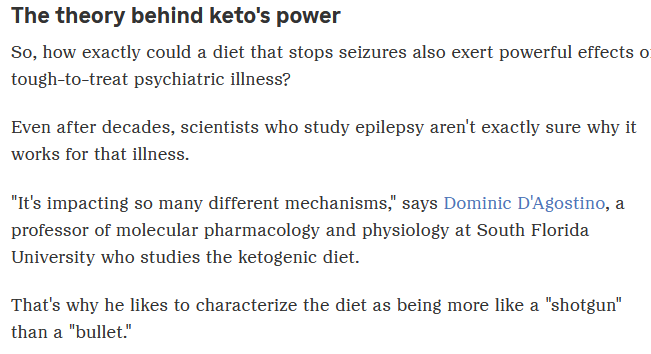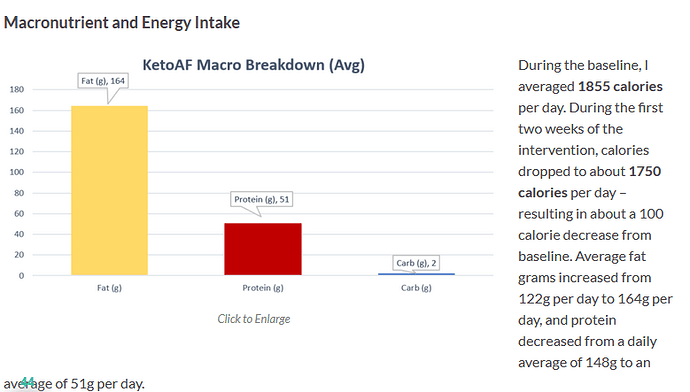A great article about ketogenic diet and how it can help those with mental health illnesses.
Keto and Mental Health : NPR Article
@VirginiaEdie
I tweaked your title just so it would be found in more searches.
It’s really good.
I think this is true. There’s so much that’s happening with the ketogenic diet, and ketones are only one part of that.

Great article. (Although they say that the keto diet is usually 90% of calories from fat, which of course is not really true. CAN you eat 90% of calories from fat? Maybe. SHOULD you? Maybe as a temporary trick, but I wouldn’t recommend it long-term. Not enough protein.)
Anyone know how to pronounce this: Iain?
You can, and the therapeutic ketogenic diet for epilepsy is about that level. However, as you say, it is deficient in protein. Seventy percent calories from fat is much more manageable, since that is roughly equal amounts of protein and fat by weight.
Also check out the Baszucki Family Foundation, which is supporting research into metabolic solutions for mental health. Matt Baszucki, the son, is badly bipolar and keeping it at bay with a ketogenic diet. Chris Palmer at Harvard has some amazing case histories of schizophrenic patients who received remarkable benefits from going keto.
As far as I know, Iain is pronounced the same as Ian. In Scots, at least; I couldn’t vouch for Irish.
You know, this is still an area where I have no idea what’s going on. Follow Maria Emmerich on Threads, and she shows people all the time who lose a ton of weight and look great, eating high protein, lower fat keto or carnivore, possibly with some PSMF. And others like Ted Naiman who like higher protein, lower fat. Then, you have others who like higher fat, lower protein, like Amber O’Hearn and others. And I can’t decipher why some people do well with higher protein, lower fat, while others do better with higher fat, lower protein. Certainly, exercise is a factor (I think higher protein could be better for those who exercise). But that’s not always the case.
This week, I’m trying 8 ounces of beef liver AND some pork fat for my lunches. And we had beef short ribs last night (48 hours sous vide at 140F, then seared on the grill), which were very fatty – and so freaking filling. Amazing, really. Whereas if I had a leaner steak, I’m sure I’d eat way more meat (dare I say “mass”?).
I do think that 90% fat would be tough. 70% you could hit with meat and maybe added butter if necessary. But 90% requires really trying to get to that.
I believe it depends upon your starting point metabolically and/or your health issues. People who are using keto to treat mental illness or epilepsy really seem to need the more therapeutic, higher fat version of keto.
I could see that. I wonder if it’s higher ketones that help?
And it’s of course complex. Let’s say you’re doing a PSMF 2-3 days a week then keto other days. You’re eating higher protein, but many fewer calories on those 2-3 days, meaning that – looking only a ketones – your ketones should increase.
Here is a good video, long but good, detailing how diet affects mental health and the inroads that have been made in that regard.
90% fat is the (apparently) necessary macro percentage for stopping a certain form of epilepsy in children. That’s a very specific reason for eating a very restrictive diet. Is this necessary for certain forms of mental illness as well?? Maybe. I suppose at some point we have to accept the reality of what works, vs. what we’d like to do.
OTOH, thankfully, I don’t think 90% is being suggested as a necessary or reasonable diet for people looking to lose weight or improve their general metabolic health.
Not the best headline, though, as my youngest daughter has autism but is not obese by any stretch. But she does eat a relatively poor diet (yes, we’re working on it, but telling a 7th grader anything is tough).
Your are right, the title is misleading but what he is referring to is not that being overweight has any correlation to autism or any mental health disorders but that the same thing that is causing obesity today is also causing the brain to not function properly which of course is the SAD.
He has seen remarkable improvement in patients when they feed their brain properly with fats rather that carbs.
There was wonderful Diet Doctor podcast all about Bipolar Disorder. Iain Campbell was interviewed along with Chris Palmer and Matt Baszucki (from the NPR story).
A few interesting things pointed out by Iain Campbell in that interview was that Bipolar Disorder is treated with anti-seizure drugs. So, there may be some kind of relationship between epilepsy and bipolar. He suffers from bipolar 2 and said that people with bipolar 2 spend more time in depressive episodes. He described his depressive episodes partly as having no energy to function. As mentioned in the article, he thinks it has something to do with mitochondrial disfunction. One doesn’t necessarily have to be obese or have metabolic syndrome to have mitochondrial disfunction. But, this could explain why a more therapeutic version of the diet is required.
I was excited to see this as well. It reminded me of the first I heard of Carrie Brown, when she talked about her mental health issues with the 2dudes. https://www.2ketodudes.com/details/125
Individual variation seems to be the best explanation. For one thing, people’s daily nitrogen loss, which determines their minimal protein requirement, is all over the place. The 0.6 g/kg figure developed from aggregating various studies is only an average.
Take a look at the graph of the data in the study that came up with the recommended minimal protein intake, and you’ll see wide variation. Some people lost very little nitrogen, while others lost a lot. The mean average tells you nothing. Furthermore, the work of Raubenheimer and Simpson suggests that people will not be satisfied until they get enough protein, no matter how much they eat.
My hypothesis (guess, in other words) is that the satisfaction of the need for protein comes first, then the satisfaction of the need for energy (fat). So someone who needs a lot of protein will have to eat relatively more protein and less fat, whereas someone who needs a smaller amount of protein will be happy on a diet of less protein and more fat. Perhaps I’m missing something, but it hardly seems a mystery to me.
That figure was not based on data, but rather on someone’s best guess at the time. Recent studies have shown that the ratio of fat to protein doesn’t need to be that high. This is good news, because some epileptic children on the therapeutic diet were damaged by protein deficiency.
The brain needs ketones for several reasons:
- fatty acids are too large to pass the blood-brain barrier;
- they serve as an alternate fuel source, especially when glucose metabolism is damaged;
- they have potent epigenetic effects on the brain;
- the brain uses them to make cholesterol, which is essential for forming myelin sheathes around the nerves and for the proper transmission of nerve impulses.
While we associate obesity with metabolic disease, around 20% of obese patients are perfectly healthy.
The medical term for them is MHO, “metabolically healthy obese.” Conversely, about 40% of thin people are metabolically ill. They have a lot of visceral fat, and the medical term for them is TOFI, “thin on the outside, fat on the inside.”
Robert Lustig makes this point rather forcefully in a number of his lectures. In the U.S. for example, there are more TOFI’s than there are obese people with metabolic dysfunction. Go figure.
This is a reasonable hypothesis, except that Amber O’Hearn and Siobhan Huggins might be eating way more fat than I would think meets your hypothesis. This was Siobhan’s KetoAF trial info:
I believe she eats similarly to this all the time, though I don’t know for sure.
This seems like not a lot of protein to me. But I can easily eat 2-3 times that for lunch.
Amber O’Hearn had the idea that there was some difference in metabolism such that a diet much higher in animal fat was better for some. The few times I tried this, I did seem to have more energy. It’s just hard to find a source of high-quality animal fat, and I don’t do well with suet. That, and my body isn’t great at digesting fat sometimes.
As for the amount of protein I “need”, boy is that a tough one. I’ve always wanted to test that. Keep the exercise similar and keep lowering protein and upping fat until I feel bad. But would I feel bad from low protein or high fat? Hard to know.
I do have some pig fat at home, and may try a week of high fat, lower protein to see what happens.
This is a medically supervised keto diet protocol that is administered in a hospital setting for the treatment of epileptic seizures in children. Food is generally given to a patient via IV. It is specific to adolescents who do not respond to medications or other diets like Atkins. When it works, it’s almost miracle-like. All foods and liquids are measured before and after. This is not your typical keto diet.
Went to school with an Irish kid (more like crapload of them (Boston) and he said his Lane/Layne. Don’t doubt it’s like Ian other places, all the rules go out the window with Irish names, I knew girls for YEARS and still couldn’t get their names right. Worst one is Saoirse, knew like 3 of them, and one of them pronounced it different, apparently part of the country or something, forget which once is which…BAD!

